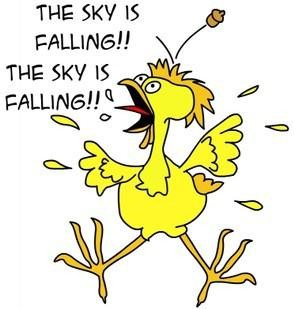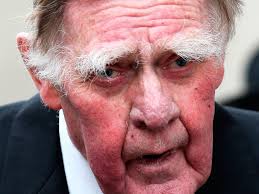My previous post focused primarily on the weapon currently used by combatants to achieve their desired end, “The Sky is Falling” , aka, fear-mongering.
Hopefully readers recognized “TSIF” as a go-to tool in broader contexts. On a personal level, my ability to employ “TSIF” served me well in various leadership contexts. Although “TSIF” has potential for negative outcomes, it always produces results, justifying its frequent use.
I am confident there are circumstances where “TSIF” is the only reasonable alternative. Some occasions may be so egregious they inherently produce a reflexive “TSIF” decision. In other circumstances where the desired end requires less urgent obedience or compliance “TSIF” works well but is overkill with potential for negative consequences.
Engaging “TSIF” has created an iceberg of issues and questions, of which “TSIF” is only the tip.
In thinking about “TSIF”, it occurs to me that what we are really talking about is motivation. MotivatIng people is the underlying issue. The challenge of motivating others is ubiquitous. Whether you are a CEO, pastor, principle, coach, politician, doctor, et al, whose success/survival is dependent upon motivating people; or, spouse, parent, relative, friend or neighbor, motivating others is essential to navigating daily life.
Despite virtually an infinite amount of material on human motivation, I want to share some thoughts from my many failures and few successes in motivating people.
Begin with the end in mind. (Steven Covey’s Habit #2 from “7 Habits of Highly Effective People”) Though Covey is not directly speaking to motivation, his advice is broadly applicable. With motivation, it is important to understand what end we have in mind.For this conversation, motivation has two connotations.
First, and most common and misguided is motivation misunderstood as movement. Compliance, obedience, relocation are its desired end; Transactional in it nature, it requires no agreement, commitment or internal change.
Second, motivation properly understood is transformation. The desired end is changed beliefs, agreement, commitment, loyalty, faithfulness, love. Motivation requires profoundly different skills and tools than movement.
To the point of Covey’s advice, “Begin with the end in mind”, when we want to motivate people we should start with the end in mind.
For example, parent’s fundamental challenge is motivating their children. Most parents begin with the end in mind, a dream of their children maturing into responsible adults (whatever that entails). Particularly in the early years, movement, compliance, obedience are necessary priorities. Of course there are deeper concerns but, if children don’t survive nothing else matters.
As a father, I held an inherited misconception that movement, compliance, obedience were primary objectives in raising children. Accordingly, motivation(?) of my children relied on a “TSIF” strategy.
( I suspect my inherited misconception had its origin in misguided application of “Train up a child in the way he should go: and when he is old, he will not depart from it.” Proverbs 22:6, but that’s another post)
Because a “TSIF” strategy always produces results, and I was successful in its application, ( there were some notable exceptions, that is also another post) I was deceived into thinking movement, compliance, obedience were clear indicators of successful parenting. I do not want to leave an impression that my strategy was all “bad”, it was the best tool for the end I had in mind.
The problem was, somewhere along the way, I lost sight of the end I envisioned and settled for a lesser end. Certainly, there are worst things than having responsible, compliant, obedient children and if that is the end you have in mind, by all means “TSIF” is the tool for you.
On the others hand, if the end you have in mind is mature, fully human adults, the means to that end are a different matter. That end requires motivation…a willfulness that transcends obedience and compliance, it comes from within, it is transforming; producing passion, resolve, courage, endurance.
The idea we can motivate our children, or anyone else, to become the end we have in mind, Is misguided. It is my belief that we cannot motivate our children, or anyone else, we can only produce movement. I would rephrase “How do I motivate my children to be good?” to “How can I live (parent) in such a way that my children will become motivated to be good?”
Motivation, in the proper sense, provides equal opportunity for good or evil. Just because someone is motivated doesn’t mean they will be good people.
Motivation, properly understood, resides in the realm of the transcendent, immune to transactional strategies. Accordingly, any answer to “How can I Live in such a way that my children will be motivated for good?” must find its source in the transcendent, not just any transcendence but goodness.
It should come as no surprise where I’m headed. The short answer to “How can I live (parent) in such a way that my children will be motivated for good?” is …live a life defined and shaped by love. Not the trite and shallow love we speak of so flippantly but a “…love love too deep for words, a gift not given by humans, but by God’s grace.” A love, when received, creates a heart that understands … People ultimately want love, not answers. Answers are not the capstone; love is. Most can do without specific explanations. No one can do without love.
I am deeply proud of our children. They are responsible adults and each is engaged in their own struggle to flourish as a human being. If there has been any meaningful contribution on my part, it comes through God’s gracious love for me. Love truly covers a multitude of sins.
Our secular, disenchanted culture, recognizing no need to look beyond ourselves for solutions, resists any impulse to accept transcendence as a path to human flourishing,. In contrast, love necessary for motivation and enjoyment of a fully human experience is a transcendent reality, and cannot be achieved, but must be received.
Which path will we choose?




